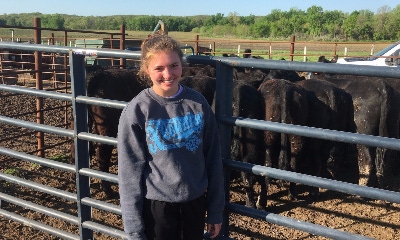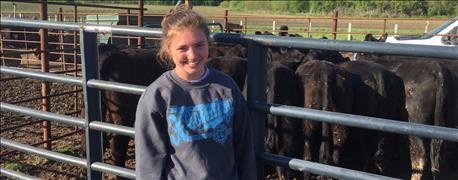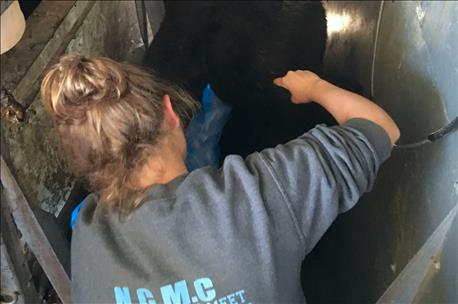
When she was just 14, Emily Eitel was at that backend of a heifer with a semen straw in hand. She spent a couple of years watching others artificially inseminate her family's cattle, but in 2012 that all changed. Emily wanted to try her own hand at the technique.
In her very first attempt, the young lady from Adair County artificially inseminated two heifers. With a 100% conception rate, she was hooked.
"I found it interesting that you can manipulate the genetics of an animal with one little straw," she explains. "Just by changing what bull semen you buy can improve your herd."
AI protégé

READY FOR ACTION: Emily Eitel is ready to artificially inseminate heifers at her family's farm outside of Novinger. She learned the technique four years ago.
Under the watchful eye of Mark Womack of B &M Angus and Greg Meier of Butch's Angus, Emily honed her skill during the last four years, artificially inseminating more heifers. Last year, her conception rate was 65%.
Not too shabby, according to her father Scott Eitel. The best conception rate on the farm has been 72% on 120 heifers, he explains, the worst is 55%. The industry average is around 62% or 63%. "So she is pretty good," he notes.
AI days are somewhat of a competition to see who can have the best conception rate, according to her mom, Melissa Eitel. "The first competition was between two boys from her school that were two or three years older than her," she notes. "Emily was the only girl." And she won.
However, the day is more about involving others in agriculture, Melissa adds. "We like to bring kids out to the farm and let them try to AI," she notes. "It shows them another side of what we do and exposes them to the cattle industry."
Rewards of AI

SEEING IN THE DARK: Emily Eitel finds he way around the inside of a heifer just by knowing anatomy. She says practice makes her successful at AI.
Emily is the fifth generation to work on the family's cattle operation outside of Novinger. Her grandpa, John Eitel, still mans the cattle chutes during AI days. The family adopted timed-AI as a practice to not only improve cowherd genetics, but also add value to the farm.
Scott says that those cattle bred with timed-AI to superior bulls are bringing on average $250 to $300 more in value at bred heifer sales.
For Emily, it is about the science.
Her next move
"I want to take it a step further," she notes, "I want to do embryo transfer. It is amazing that you can take the embryo with one cow's genetics and put it into a recip cow that does not have the cow or bull genetics and still produce a calf. It is just cool."
The recent graduate of Kirksville High School will have plenty of time to practice, as she will be continuing her passion for animal science at the University of Missouri Columbia College of Agriculture, Food and Natural Resources in the fall.
About the Author(s)
You May Also Like






